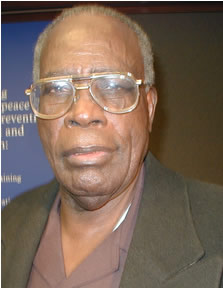
A Response To Gbai Gbala’s Assertions about African Intellectuals in the Diaspora
The Perspective
Atlanta, Georgia
November 8, 2004
However, when I told a friend that I was going to respond to this article, she lamented: “Why do they even publish such absurd ideas?” I replied: governing the publication of such views is left to the marketplace of ideas because they provide salient examples of what it means to live in a free society. When ideas that have little or no intellectual value are disseminated, they provide opportunities for public education to occur, thus serving as a public good. Even more important, this is just not an attack on a countryman, it is an invective against one of the few beacons that have ever shined on our entire dark continent, Africa, which gets much darker with the passing of every day appealing to its sons and daughters for noble citizens to rescue it from the throes of dictators, thieves, and scoundrels. This mandate alone impels us to quickly fend off such misguided view by Mr. Gbala. Perhaps, Mr. Gbala has been prompted to caricature African intellectuals presumably because of circumstances whereby some public intellectuals have foregone the integrity to comment on and criticize government officials and national policies in their respective countries of origin. And even in these instances, the rights of these persons to voice their opinions on events happening in their homeland is one that Mr. Gbala or anyone else cannot prevent, especially when these people are living in democratic nations. Could it be that Mr. Gbala is deluded into thinking that he still has the power to muzzle people into silence in the Doe regime? The integrity and rights of intellectuals living in exile must be defended. However, such a defense does not flow from wanting to prove Mr. Gbala wrong for his colossal arrogance, but for two key reasons. One has to awaken Mr. Gbala from metaphorical slumber and remind him that the fate of Liberian scholars and our neighbors in Sierra Leone, and even in the Cote D’ Ivoire, which is currently in the throes of conflict, was not of our own making. He, Mr. Gbala, was one of many architects of the dismally unsuccessful policies that caused the forced displacement of many Liberian scholars from their homeland, and in part, set off the vicious cycles of recrimination that have destabilized the West African sub-region. A second point is that Mr. Gbala may lack the clarity, perhaps the critical expertise to decipher that rebuilding Liberia will take evidence-based best practices; that are by products of empirically validated research, which intellectuals conduct to inform policymaking and spur good governance. Mr. Gbala’s assertion leads me to believe that he knows very little about such a process, since policymaking during his era in Liberia, was a product of guesswork and greed. Noteworthy too, Mr. Gbala should not be fooled into believing that he has the acumen that would have made him a Presidential Advisor in a merit-oriented government with clearly articulated portfolio of competencies for policy analysts to assume such a critical role. Most importantly, the sort of masquerading by Mr. Gbala is one that deserves a rebuttal because without that, we will be allowing the toxic tradition of apathy and indifference that continuously helps to breed misperception. These occasions are also necessary to encourage and support aspiring scholars that intellectual pursuits are worthy; hence, they need not be dismayed by the fits of laughter” that emanate from opportunists who find refuge in badmouthing scholars sweepingly. True, there are bad examples of African academics whose credentials are riddled with squandered opportunities to make positive impacts on society, professor Chinua Achebe is not one of them. Moreover, Mr. Bai Gbala does not have the moral authority to speak on this matter. This attempt by Mr. Gbala to reinvent” himself, having served as a perpetrator of awful governance paradigms and policies that in part, contributed to the war in Liberia, that also partially induced war in neighboring Sierra Leone and Cote D’ Ivoire is clearly a strategy that deserves to be unearthed. Mr. Gbala would have served his legacy well if he restricted his academic moorings to his last article on decentralization, which in my view was good work. Africans in general, and Liberians particularly, need to find solace in the fact that the many murky thinkers in our midst who vacillate between occasional contemplation and then swiftly reverting to feeble thinking are revealing themselves as the nation verges on rebuilding and redefining the contours of concrete skill sets needed to erect an infrastructure for a modernized society. About the author: Emmanuel Dolo lives with his family in Maplewood, Minnesota. He can be contacted at edolo@hsicares.org. |

